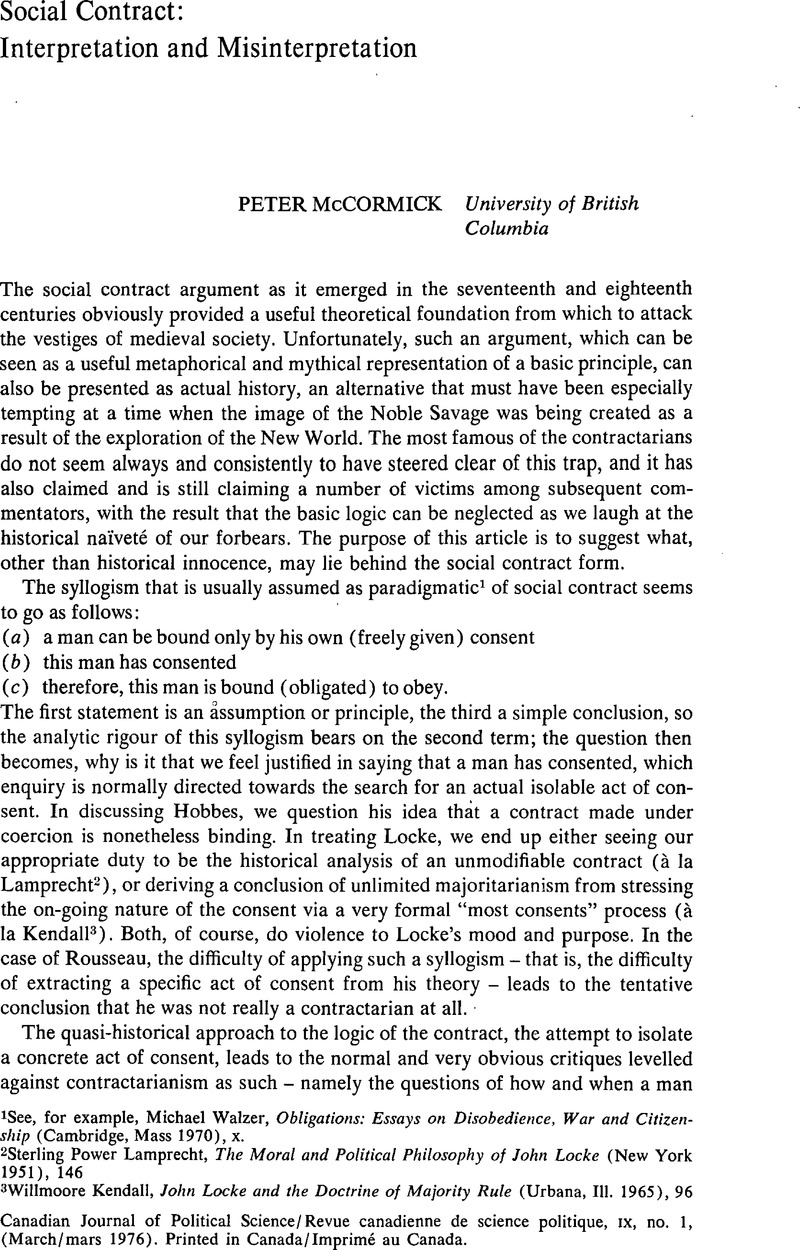Published online by Cambridge University Press: 10 November 2009

1 See, for example, Walzer, Michael, Obligations: Essays on Disobedience, War and Citizenship (Cambridge, Mass 1970), x.Google Scholar
2 Lamprecht, Sterling Power, The Moral and Political Philosophy of John Locke (New York 1951), 146Google Scholar
3 Kendall, Willmoore, John Locke and the Doctrine of Majority Rule (Urbana, Ill. 1965), 96Google Scholar
4 Quoted in Dunn, John, The Political Thought of John Locke (Cambridge 1969), 112CrossRefGoogle Scholar
5 de Jouvenel, Bertrand, The Pure Theory of Politics (Cambridge 1963), 45Google Scholar
6 de Maistre, Joseph, The Study of Sovereignty, quoted from the extract in The French Right, ed. McClelland, J.S. (New York 1971), 40Google Scholar
7 Seliger, M., The Liberal Politics of John Locke (London 1968), 398Google Scholar
8 “Obligation and Consent – I,” The American Political Science Review, LIX, 4 (December 1965), 997
9 Gough, , The Social Contract (Cambridge, 2nd ed., 1957), 112Google Scholar, cf. 164
10 The phrase is from Dunn, The Political Thought of John Locke.
11 See, for example, the discussion in Sabine, G.H., A History of Political Theory (London, 3rd ed., 1961)Google Scholar, chap. xxi. The discussion in this article is based on the LLA translation of the Prolegomena to the Laws of War and Peace
12 See Shklar, Judith N., Men and Citizens: A Study of Rousseau's Social Theory (London 1969).Google Scholar
13 “Of the Original Contract,” in David Hume's Political Essays, ed. Hendel, Charles W. (Indianapolis and New York 1953)Google Scholar
14 Political Obligation (New York 1972), 205–6
15 Ibid., 231
16 A History of Political Theory, 465
17 Charvet, John, “The Idea of Equality as a Substantive Principle of Society,” in Contemporary Political Theory, ed. de Crespigny, A. and Wertheimer, W. (New York 1970)Google Scholar
18 “Of the Original Contract,” 56
19 (Garden City, NY 1958)
20 See, for example, Levin, Michael, “Uses of the Social Contract Method: Vaughan's Interpretation of Rousseau,” The Journal of the History of Ideas, 28 (1967)CrossRefGoogle Scholar
21 Dérathé, Robert, J-J Rousseau et la Science Politique de Son Temps (Paris 1950), 44Google Scholar
22 Samuel Pufendorf, Droit de la nature ed des gens, liv. vi chap, II, no. 4; quoted at length in Dérathé, Rousseau et la Science Politique, 188
23 “Obligation and Consent – 1”
24 Rousseau et la Science Politique, 27